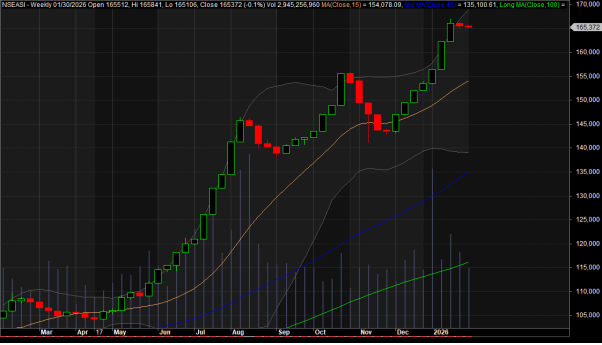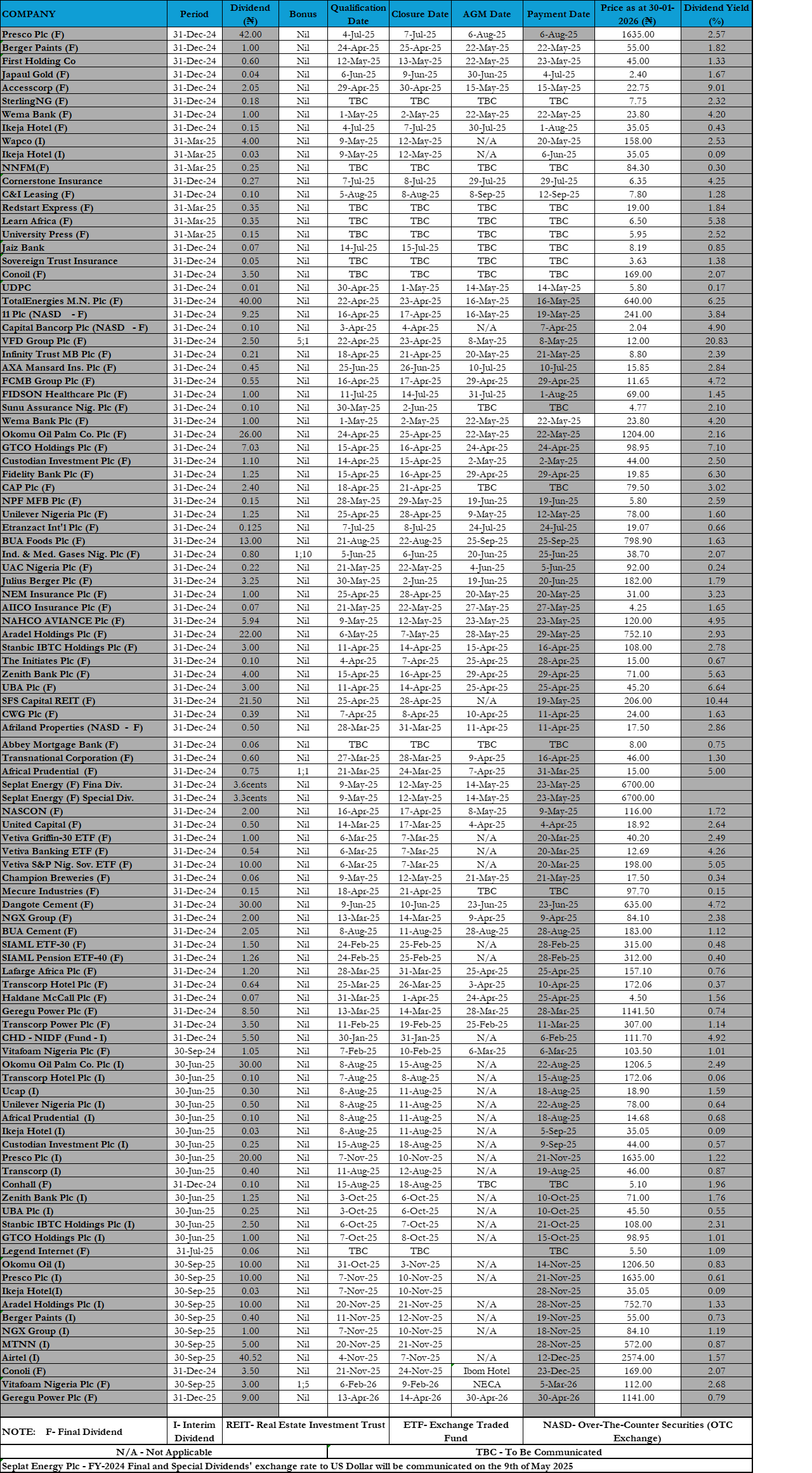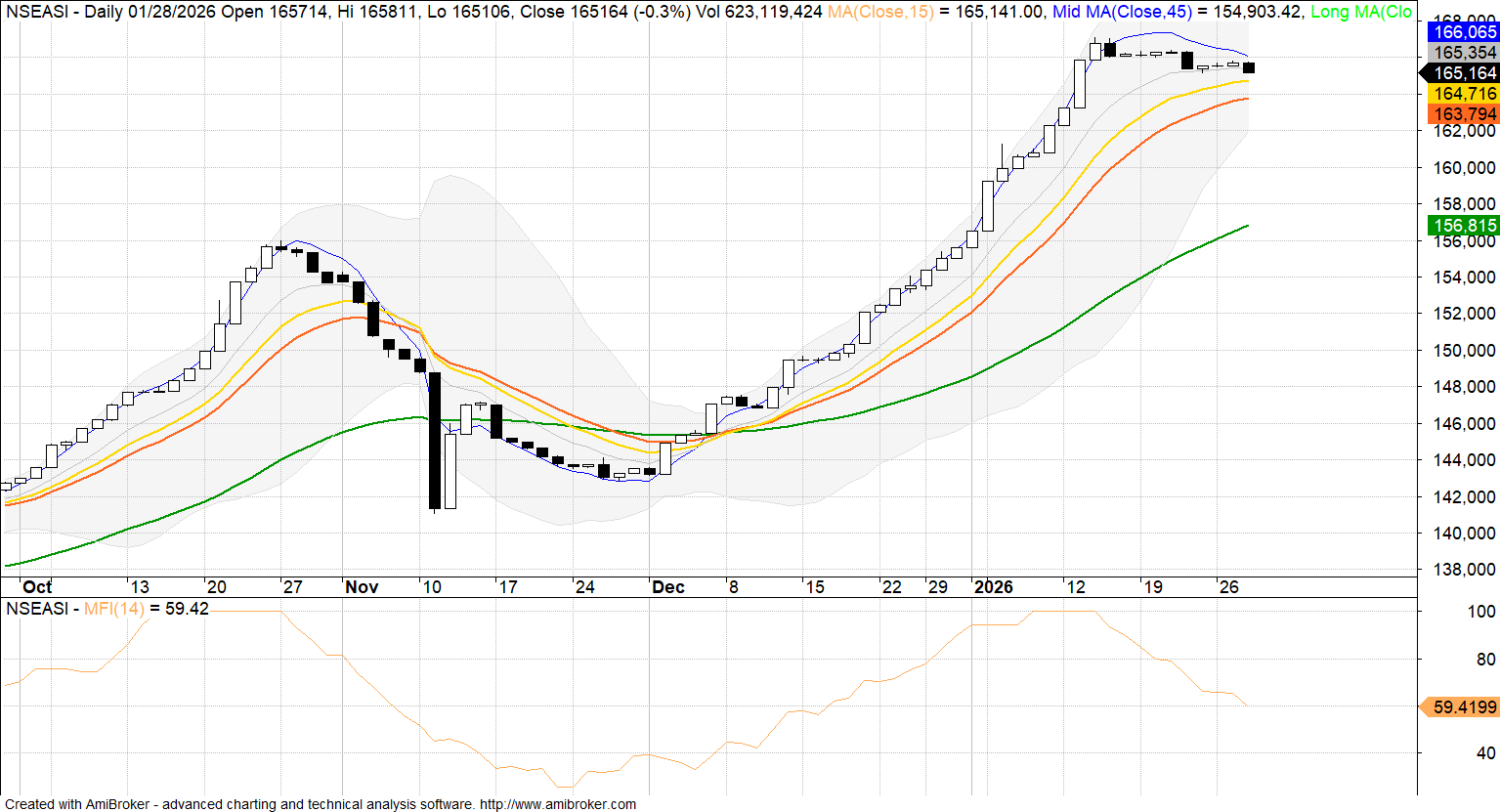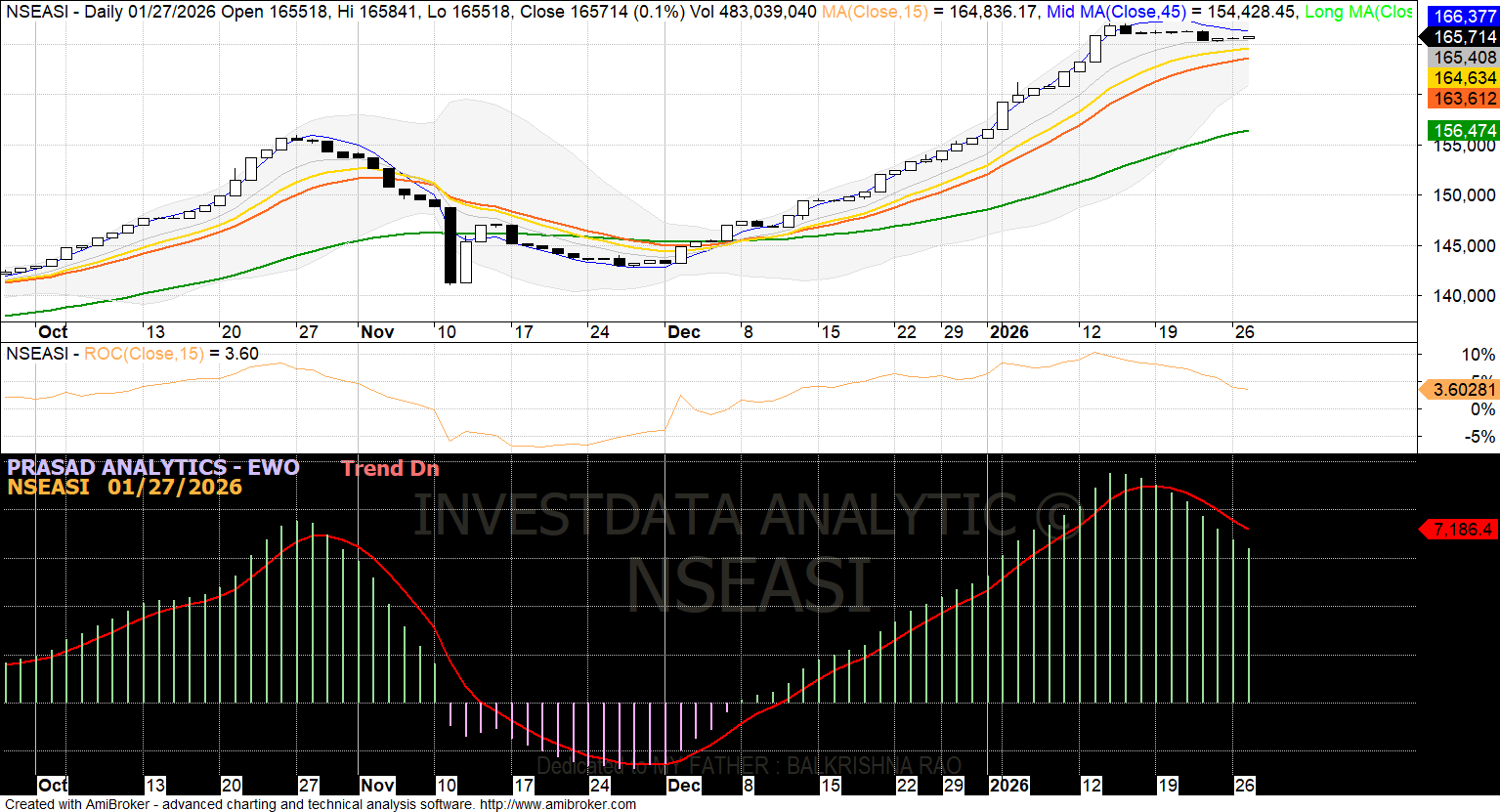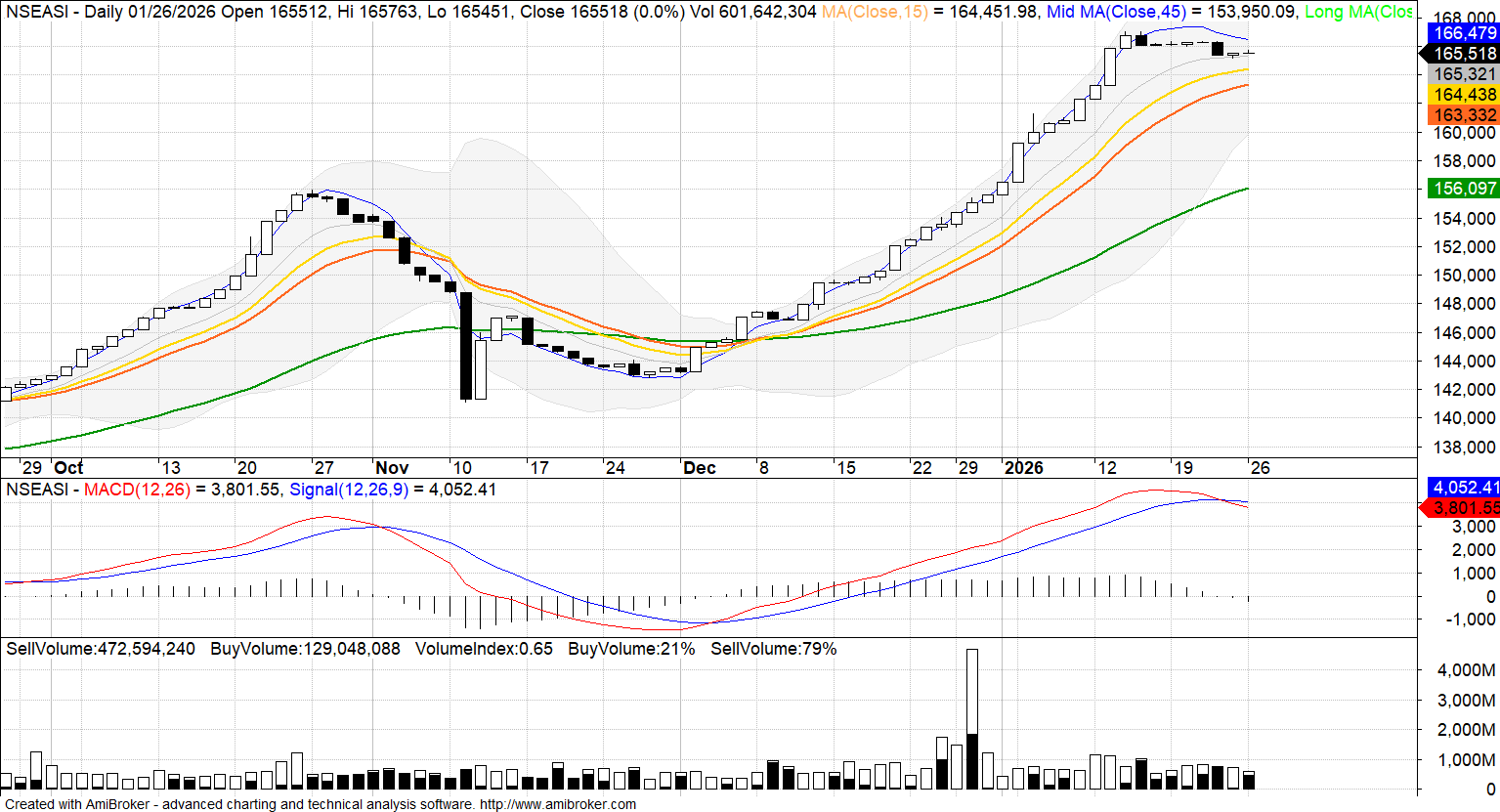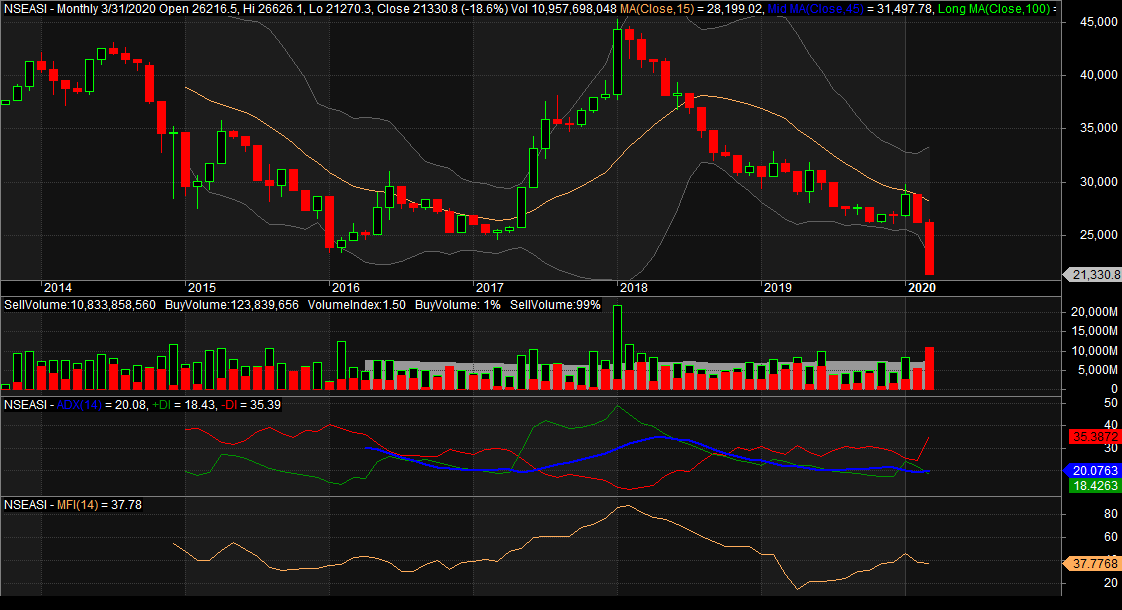
March Market Roundup And Outlook For April
Equity prices had a free fall for the month of March on the Nigerian Stock Exchange (NSE), reflecting the weak actions and uncertainties across global markets as crude oil prices collapsed helplessly, touching a new 18-year low on March 30. It, however, rebounded on the last day of the month on the news that the US and Russia are discussing the impact of the ravaging Coronavirus pandemic and the global lockdown on the price of crude oil, as it closed $21.67 per barrel.
The Covid-19 storm has wrecked many stock markets and economies the world over quicker than was seen during the global financial crisis of 2008/2009.
The negative sentiment that hit the Nigerian stock market over the last two months of the 2929 first quarter ranged from an adjustment in the Cash Reserve Requirement of banks to 27.5% by the Monetary Policy Committee of the Central Bank of Nigeria (CBN), as well as the weak macroeconomic indices. The impact of these factors was made worse by panic measures that accompanied Covid-19, which has so far recorded over 787,000 cases and 34,000 deaths globally, as factories shut down, among measures to check the spread.
Nigeria has also recorded a daily increase in the number of new cases to 139 and two deaths since February when the index case of the virus was recorded in the country.
Fears arising from the pandemic have seen capital flight from the emerging and frontier markets, due to the imminent global recession, as the benchmark indexes of many stock markets suffered declines of over 20% since February. In the case of the Nigeria Stock Exchange (NSE), its composite All-Share index has suffered a monthly and quarterly decline of 18.75% and 20.65% respectively, confirming the bear-run in the market. The good thing, however, is that has created a “buy” opportunity for discerning and intelligent investors.
The market’s reaction to the seemingly high dividend payout and yield in the midst of mixed earnings reports by most companies that reflects the weak economic fundamentals and realities of the 2019 financial year, being an election year was poor as smart money took to flight due to panic selloffs resulting from the virus-induced bear market. This was reflected in the Money Flow Index that pointed downward throughout the month under review as the NSEASI broke down five psychological lines between 26,000 and 22,000 on continued selloffs.
Besides the low investor confidence, there is also a lack of an economic direction, as investors await the government’s economic policy and the reforms needed to stimulate growth and complement the CBN’s unconventional monetary policies before the deadly virus hit the world and the nation.
The mismatch of policies of the government and its economic managers since Q3 of 2019 has continually weakened the macroeconomic indicators inflation and Purchasing Manager’s Index (PM1) as the February inflation rate rose to its 23-month high of 12.2% from12.13% in January. This was just as the manufacturing sector recorded the slowest expansion in the month of March as Purchasing Managers Index stood at 51.1points, from 58.3 points in February.
The market extended its negative sentiment from February, as the NSE’s composite index fell by 18.75% in March, after 13 sessions of the bear market and nine up sessions. The period witnessed mixed trades and trend despite being the peak month of the earnings reporting season before the deadline was extended by 60 days, due to the effects of Covid-19. The pandemic also resulted in the NSE management activating the first level of its business continuity plan leading to a shutdown of the trading flow, allowing for only remote access to curtail. The bourse has also moved on to the second leg of its business continuity plan by moving essential staff nearby to ensure the market remains open during the period of the lockdown announced by President Muhammadu Buhari on Sunday night (READ MORE).
Within the month under review also, 32 companies released their full-year 2019 audited results, while 20 rewarded their shareholders with offers of dividend payment. Three companies- Vitafoam Nigeria, Zenith Bank, and Guaranty Trust Bank paid their dividend on their stipulated dates, just as Guaranty Trust Bank has become the first company in Nigeria to hold its Annual General Meeting virtually, and paid the dividend accordingly.
The boards of eight companies: United Bank for Africa, United capital, Africa Prudential, Transnational Corporation of Nigeria, African Prudential, Transcorp Hotel, and Morison Industries, however, postponed their AGM and dividend payment to their investors, due to Covid-19 fallout.
On Tuesday, the last trading day of the month, the NSE index closed negative at 21,300.47 basis points.
During the month, the index touched an intra-month peak of 26,626.07 basis points and low of 21,270.26bps, after opening at 26,216.46bps on a huge traded volume, compared to the previous month.
Also, market capitalisation for the period closed at N11.10tr from N13.66tr, representing an 18.74% decline, helped by the listing of additional shares in favour of Golden Guinea Breweries within the month.
Market technicals for the month were negative and mixed, with volume traded higher than that of February in the midst of negative breadth and high selling pressure, as revealed by Investdata’s monthly Sentiment Report, showing sell position of 99% and buy volume at 1%. The monthly total transaction volume index was 1.50, just as momentum behind the market’s performance for the month was weak as shown by the money flow index at 37.71points, from the previous month’s 37.78ps. This is an indication that funds left the market, following the persistent selloff in midst of fewer 2019 earnings reported and fear of Covid 19 impact on the stock market and economy.
Market breadth for the month was negative and weak as decliners outnumbered advancers in the ratio of 57:15. Transaction volume for the period increased by 94.67% at 10.96bn shares, compared to the 5.63bn units that changed hands in February.
Sectoral Performance
All the sectoral indices for the period closed in red, except for the NSE Insurance that rose by 2.67%, while the worst hit was the Consumer Goods index which lost 28.93%.

Best Performing Stock
The panic selloffs amidst the poor reactions to corporate earnings released reflected in the number of stocks that appreciated in value, with the best-performing stocks at over 20% gain for the month being low cap stocks like Union Diagnostic and NPF Microfinance which gained 30% and 21.05% respectively on market forces. They were followed by 11 Plc that gained 20.80% on expectation of 2019 results and dividend; ahead of Eterna’s 20.10% on its low price attractive despite its unimpressive scorecard. See the table below for more.
We advise investors take advantage of the high yields in the market to position in fundamentally sound stocks, ahead of the 2020 first-quarter numbers expected to hit the exchange in April, irrespective of the current happening in the market.
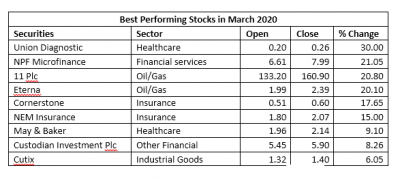
Worst Laggards
Lafarge Africa was the worst laggard, shedding 40.65% in a month when the virus-driven bear market hit the company share price ahead of it full result followed by Zenith Bank’s 36.76% slide on price adjustment for dividend and bearish trend, while Nigerian Breweries lost 36.67% of its opening price during the period.

Technical View
The composite NSEASI in January attempted to break out the downtrend line on a high buying interest but pulled back in February and March on high traded volume and negative sentiments due to noticeable indecision and persistent selloffs among market players. There was also the effect of the prevailing low confidence and liquidity as reflected in the money flow index at 37.71 points, down from 37.78points in the prior month.
Meanwhile, the NSE index continues to trade below all the shortest Moving Average on a monthly time frame, while MACD remains bearish.
With the extended submission of 2019 full year audited financials by two months and expected 2020 first-quarter earnings reports in the new month, as companies had started notifying the exchange of their closed period. Portfolio repositioning and rebalancing among traders and investors are expected but the 14-day lockdown of Lagos State and the ongoing remote trading may affect volume traded and the rate at which investors take advantage of the low prices. Also analyzing the numbers released so far in expectation of 2020Q1 numbers will give an insight into what to expect from the companies in the cause of 2020 and beyond.
Expectations For April/May
The 14-day lockdown is likely to influence the market negatively, knowing that the month of April is an extension of the earnings reporting season due to expected quarterly results now that NSE has given 60 days grace to submit 2019 full-year results. This is why traders and investors should be in the market to benefit from the corporate actions already pouring in.
Know that the earnings season momentum, as well as liquidity, determine market movement/direction, as such, we should expect:
• Macro-economic data to drive investment decisions and know the economic state of the nation.
• Market oscillation due to panic selloffs and position-taking with some corporate results released.
• The gradual inflow of funds into the equity market, as a reaction to low equity prices and low rate in the money market, besides the fluctuations as foreign and institutional investors return or exit the market. This oscillation is expected to create entry and exit opportunities.
• More full-year and quarterly results are expected since the 2019 full-year audited earnings filings are extended. These earnings from blue-chip companies are likely to strengthen fundamentals, depending on the quality and value of their numbers. But due to economic slowdown in Q1 2020, we do not expect much from the quoted companies
• As investors reshuffle their portfolios to move into equities with strong fundamentals, high Dividend Yield, and possible bonus issues, we should expect stock prices to gravitate upward or down, if their numbers beat expectations.
• Expect the current volatility to continue into the last month of 2020Q2, amidst repositioning for Q3, even as we expect confidence and liquidity to improve.
• Market outlook for the month of April and May remains unstable and mixed, but investors should invest wisely, using dates, bids, offers, and volume when taking an investment decision.
• Managing risk and protecting capital at this point is very important, as it will help determine when to buy or sell, by watching the stocks and the market, using technical analysis, aided by investdata buy & sell signal for weekly traders and medium/long term investors.
• Let numbers emanating from companies and the markdown dates guide you into a profitable investment.


